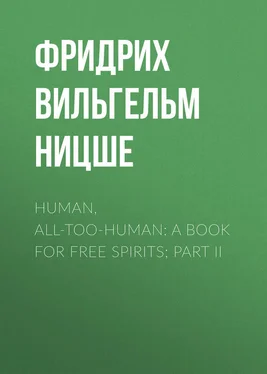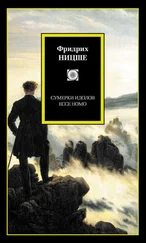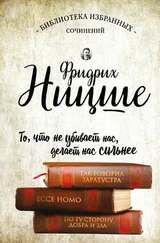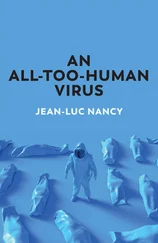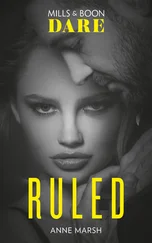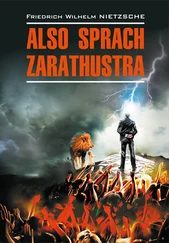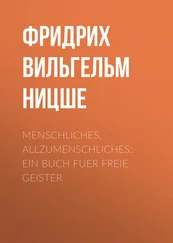Фридрих Ницше - Human, All-Too-Human - A Book For Free Spirits; Part II
Здесь есть возможность читать онлайн «Фридрих Ницше - Human, All-Too-Human - A Book For Free Spirits; Part II» — ознакомительный отрывок электронной книги совершенно бесплатно, а после прочтения отрывка купить полную версию. В некоторых случаях можно слушать аудио, скачать через торрент в формате fb2 и присутствует краткое содержание. Жанр: Философия, literature_19, foreign_antique, foreign_prose, на английском языке. Описание произведения, (предисловие) а так же отзывы посетителей доступны на портале библиотеки ЛибКат.
- Название:Human, All-Too-Human: A Book For Free Spirits; Part II
- Автор:
- Жанр:
- Год:неизвестен
- ISBN:нет данных
- Рейтинг книги:3 / 5. Голосов: 1
-
Избранное:Добавить в избранное
- Отзывы:
-
Ваша оценка:
- 60
- 1
- 2
- 3
- 4
- 5
Human, All-Too-Human: A Book For Free Spirits; Part II: краткое содержание, описание и аннотация
Предлагаем к чтению аннотацию, описание, краткое содержание или предисловие (зависит от того, что написал сам автор книги «Human, All-Too-Human: A Book For Free Spirits; Part II»). Если вы не нашли необходимую информацию о книге — напишите в комментариях, мы постараемся отыскать её.
Human, All-Too-Human: A Book For Free Spirits; Part II — читать онлайн ознакомительный отрывок
Ниже представлен текст книги, разбитый по страницам. Система сохранения места последней прочитанной страницы, позволяет с удобством читать онлайн бесплатно книгу «Human, All-Too-Human: A Book For Free Spirits; Part II», без необходимости каждый раз заново искать на чём Вы остановились. Поставьте закладку, и сможете в любой момент перейти на страницу, на которой закончили чтение.
Интервал:
Закладка:
A Choice Reality. – Just as the good prose writer only takes words that belong to the language of daily intercourse, though not by a long way all its words – whence arises a choice style – so the good poet of the future will only represent the real and turn his eyes away from all fantastic, superstitious, half-voiced, forgotten stories, to which earlier poets devoted their powers. Only reality, though by a long way not every reality – but a choice reality.
Degenerate Species of Art. – Side by side with the genuine species of art, those of great repose and great movement, there are degenerate species – weary, blasé art and excited art. Both would have their weakness taken for strength and wish to be confounded with the genuine species.
A Hero Impossible from Lack of Colour. – The typical poets and artists of our age like to compose their pictures upon a background of shimmering red, green, grey, and gold, on the background of nervous sensuality – a condition well understood by the children of this century. The drawback comes when we do not look at these pictures with the eyes of our century. Then we see that the great figures painted by these artists have something flickering, tremulous, and dizzy about them, and accordingly we do not ascribe to them heroic deeds, but at best mock-heroic, swaggering mis deeds.
Overladen Style. – The overladen style is a consequence of the impoverishment of the organising force together with a lavish stock of expedients and intentions. At the beginnings of art the very reverse conditions sometimes appear.
Pulchrum est paucorum hominum. – History and experience tell us that the significant grotesqueness that mysteriously excites the imagination and carries one beyond everyday reality, is older and grows more luxuriantly than the beautiful and reverence for the beautiful in art: and that it begins to flourish exceedingly when the sense for beauty is on the wane. For the vast majority of mankind this grotesque seems to be a higher need than the beautiful, presumably because it contains a coarser narcotic.
Origins of Taste in Works of Art. – If we consider the primary germs of the artistic sense, and ask ourselves what are the various kinds of joy produced by the firstlings of art – as, for example, among savage tribes – we find first of all the joy of understanding what another means. Art in this case is a sort of conundrum, which causes its solver pleasure in his own quick and keen perceptions. – Then the roughest works of art remind us of the pleasant things we have actually experienced, and so give joy – as, for example, when the artist alludes to a chase, a victory, a wedding. – Again, the representation may cause us to feel excited, touched, inflamed, as for instance in the glorification of revenge and danger. Here the enjoyment lies in the excitement itself, in the victory over tedium. – The memory, too, of unpleasant things, so far as they have been overcome or make us appear interesting to the listener as subjects for art (as when the singer describes the mishaps of a daring seaman), can inspire great joy, the credit for which is given to art. – A more subtle variety is the joy that arises at the sight of all that is regular and symmetrical in lines, points, and rhythms. For by a certain analogy is awakened the feeling for all that is orderly and regular in life, which one has to thank alone for all well-being. So in the cult of symmetry we unconsciously do homage to rule and proportion as the source of our previous happiness, and the joy in this case is a kind of hymn of thanksgiving. Only when a certain satiety of the last-mentioned joy arises does a more subtle feeling step in, that enjoyment might even lie in a violation of the symmetrical and regular. This feeling, for example, impels us to seek reason in apparent unreason, and the sort of æsthetic riddle-guessing that results is in a way the higher species of the first-named artistic joy. – He who pursues this speculation still further will know what kind of hypotheses for the explanation of æsthetic phenomena are hereby fundamentally rejected.
Not too Near. – It is a disadvantage for good thoughts when they follow too closely on one another, for they hide the view from each other. That is why great artists and writers have made an abundant use of the mediocre.
Roughness and Weakness. – Artists of all periods have made the discovery that in roughness lies a certain strength, and that not every one can be rough who wants to be: also that many varieties of weakness have a powerful effect on the emotions. From this source are derived many artistic substitutes, which not even the greatest and most conscientious artists can abstain from using.
Good Memory. – Many a man fails to become a thinker for the sole reason that his memory is too good.
Arousing instead of Appeasing Hunger. – Great artists fancy that they have taken full possession of a soul. In reality, and often to their painful disappointment, that soul has only been made more capacious and insatiable, so that a dozen greater artists could plunge into its depths without filling it up.
Artists' Anxiety. – The anxiety lest people may not believe that their figures are alive can mislead many artists of declining taste to portray these figures so that they appear as if mad. From the same anxiety, on the other hand, Greek artists of the earliest ages gave even dead and sorely wounded men that smile which they knew as the most vivid sign of life – careless of the actual forms bestowed by nature on life at its last gasp.
The Circle must be Completed. – He who follows a philosophy or a genre of art to the end of its career and beyond, understands from inner experience why the masters and disciples who come after have so often turned, with a depreciatory gesture, into a new groove. The circle must be described – but the individual, even the greatest, sits firm on his point of the circumference, with an inexorable look of obstinacy, as if the circle ought never to be completed.
The Older Art and the Soul of the Present. – Since every art becomes more and more adapted to the expression of spiritual states, of the more lively, delicate, energetic, and passionate states, the later masters, spoilt by these means of expression, do not feel at their ease in the presence of the old-time works of art. They feel as if the ancients had merely been lacking in the means of making their souls speak clearly, also perhaps in some necessary technical preliminaries. They think that they must render some assistance in this quarter, for they believe in the similarity or even unity of all souls. In truth, however, measure, symmetry, a contempt for graciousness and charm, an unconscious severity and morning chilliness, an evasion of passion, as if passion meant the death of art – such are the constituents of sentiment and morality in all old masters, who selected and arranged their means of expression not at random but in a necessary connection with their morality. Knowing this, are we to deny those that come after the right to animate the older works with their soul? No, for these works can only survive through our giving them our soul, and our blood alone enables them to speak to us . The real “historic” discourse would talk ghostly speech to ghosts. We honour the great artists less by that barren timidity that allows every word, every note to remain intact than by energetic endeavours to aid them continually to a new life. – True, if Beethoven were suddenly to come to life and hear one of his works performed with that modern animation and nervous refinement that bring glory to our masters of execution, he would probably be silent for a long while, uncertain whether he should raise his hand to curse or to bless, but perhaps say at last: “Well, well! That is neither I nor not-I, but a third thing – it seems to me, too, something right, if not just the right thing. But you must know yourselves what to do, as in any case it is you who have to listen. As our Schiller says, ‘the living man is right.’ So have it your own way, and let me go down again.”
Читать дальшеИнтервал:
Закладка:
Похожие книги на «Human, All-Too-Human: A Book For Free Spirits; Part II»
Представляем Вашему вниманию похожие книги на «Human, All-Too-Human: A Book For Free Spirits; Part II» списком для выбора. Мы отобрали схожую по названию и смыслу литературу в надежде предоставить читателям больше вариантов отыскать новые, интересные, ещё непрочитанные произведения.
Обсуждение, отзывы о книге «Human, All-Too-Human: A Book For Free Spirits; Part II» и просто собственные мнения читателей. Оставьте ваши комментарии, напишите, что Вы думаете о произведении, его смысле или главных героях. Укажите что конкретно понравилось, а что нет, и почему Вы так считаете.
